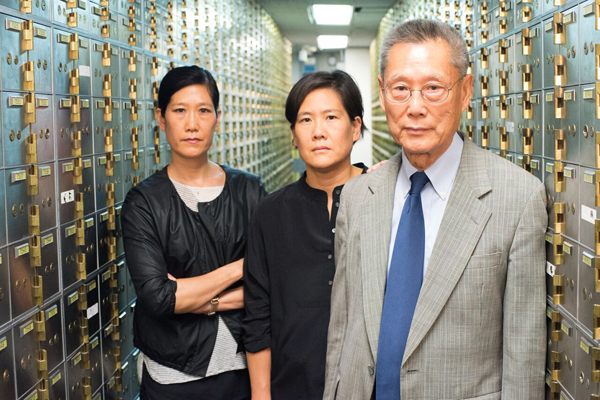Abacus: Small Enough to Jail is nearly a tragedy, the story of a good man brought down despite having the best of intentions. It centers on a family savings bank founded in New York City’s Chinatown by Thomas Sung, an immigrant turned successful attorney who sought to give back to his community. During the early scenes, which chronicle Abacus Federal Savings Bank’s rise, he is sincerely compared to George Bailey, the gold-hearted protagonist of Frank Capra’s 1946 classic It’s a Wonderful Life. For both Sung and Bailey, their life’s mission is to provide loans for homes, although Sung’s customer base is the underserved Chinese immigrant population.
Another way in which Sung resembles Bailey is that they become underdogs against an existential threat, which in the former’s case is a federal investigation into bad mortgages that turns into a witch hunt aimed at putting Abacus out of business. The trouble first arises when one of the bank’s loan originators is found to have falsified documents for several mortgage loans, which the bank sold to the government-sponsored lender Fannie Mae. Although Sung’s daughters, who work as executives at Abacus, fire the employee and even provide copies of various records to federal regulators, the New York District Attorney’s office charges the bank with fraud.
As interviewees point out, the indictment occurred in 2012, during the aftermath of the subprime mortgage crisis. The climate of the time was one in which federal regulators were looking for scapegoats, and they found an ideal one in Abacus. Here was a bank that sold a few bad mortgages back to the federal government. However, it was small enough that if punished into oblivion, it wouldn’t cause too many aftershocks through the rest of the banking industry. The film and its subjects make their case by comparing and contrasting the treatment of larger financial institutions with the Sungs. The giant banks had the option of paying a fine or accepting a lesser charge. By contrast, Abacus could only plead guilty or try to fight the fraud charge.
The film delves into the heavy-handed tactics committed by the DA’s office against Abacus’ loan borrowers, intended to scare them into admitting guilt. They knocked on doors during the early morning, sans warrants, and demanded people come down to the police station. (Some complied, given they were unfamiliar with the U.S. criminal justice system.) In addition, prosecutors launched the equivalent of a smear campaign featuring one especially despicable moment, in which bank employees who had been arraigned were handcuffed together and paraded before the press—a stunt so vicious that one interviewee described it as “Stalin-esque.”
During the actual trial, the DA office’s game plan is to discredit the Chinese community itself, by painting it as a hotbed of illegal activity. They point out minor irregularities, such as letters relating to monetary gifts, which, as both the borrowers and lenders understand them, are more like loans. The film goes to great lengths to argue nothing illegal is happening; rather, it has more to do with how those from the East and West conceive of loans differently. Eventually, James and his subjects serve up a rather ironic twist: a letter from Fannie Mae, which acknowledges there are unique cultural challenges in serving the Chinese immigrant market and promises to work with Abacus.
As an exploration of financial fraud, and how complicated it can be to prove culpability, the film actually suffers due to the DA’s flimsy case, which is built around a witness proven to be a self-serving liar. It’s more effective as a David versus Goliath tale in which ethnicity plays a factor, as it’s argued that the stereotype of the Chinese as weak and unwilling to fight back is partly why this specific bank was targeted. That notion is sharply disproven by the Sungs, and especially the three grown-up daughters, each of whom is an attorney as well as a strong-willed, independent woman fighting for the family’s legacy.
The director is Steve James, whose best-known film to date remains Hoop Dreams (1994), which was as much about the familial units surrounding young black men coming of age through basketball as it was about the sport itself. Similarly, Abacus is ostensibly about a manufactured scandal and subsequent trial. However, its beating heart is the Sungs. For this hard-working, second-generation immigrant family, it’s clear that familial dynamics and business matters are inextricably woven. Boardroom sessions are peppered with amusing moments, such as the daughters doting on their father when he isn’t happy with his lunch or the mother scolding her children for raising their voices at her.
The film is also a respectful portrait of the Chinese community in New York City. Even when things are at their most uncertain, Thomas can walk through the neighborhood and greet familiar faces who take strength from him—and offer some back in return. No one seems to have forgotten all he’s done over the years. Doubtless, these are moments Capra himself would have found inspiring.







Leave A Comment